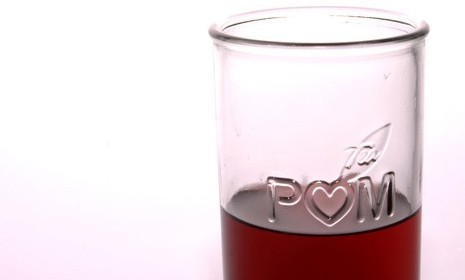POM juice and 5 other products that promised too much
POM Wonderful has been charged with overstating its juice's health benefits, an all-too-common offense on grocery-store shelves

A free daily email with the biggest news stories of the day – and the best features from TheWeek.com
You are now subscribed
Your newsletter sign-up was successful
The Federal Trade Commission last week charged POM Wonderful with making "false and unsubstantiated" claims about the miraculous powers of its pomegranate elixir to help prevent heart disease, prostate cancer, and erectile dysfunction. And the company is not alone — in recent years, many producers of supplements and foods have run afoul of consumers and government agencies with packaging that promised more than the products could deliver. (Watch POM's president defend the juice's health benefits.) Here are five other cases:
1. Mouthwash is no substitute for the dentist
The Food and Drug Administration last week scolded Johnson & Johnson, CVS, and Walgreens over false claims about their mouthwashes. The companies received letters warning them to stop making "unproven claims" about their products' ability to prevent gum disease and remove plaque.
The Week
Escape your echo chamber. Get the facts behind the news, plus analysis from multiple perspectives.

Sign up for The Week's Free Newsletters
From our morning news briefing to a weekly Good News Newsletter, get the best of The Week delivered directly to your inbox.
From our morning news briefing to a weekly Good News Newsletter, get the best of The Week delivered directly to your inbox.
2. Airborne: No cure for the common cold
In 2008, the makers of Airborne, a popular herbal supplement advertised as a "miracle cold buster," settled a $23.3 million class action over complaints that the cold-busting claims were bogus.
3. Dannon's Activia: "Ordinary yogurt," extraordinary claims?
Earlier this year, Dannon had to pay out $45 million to settle a lawsuit over its Activia yogurt. A federal judge ruled that advertising claims that the yogurt was clinically proven to aid digestion and help strengthen the immune system were disingenuous. "Deceptive advertising has enabled Dannon to sell hundreds of millions of dollars worth of ordinary yogurt at inflated prices to responsible, health-conscious consumers," an attorney involved with the case said.
A free daily email with the biggest news stories of the day – and the best features from TheWeek.com
4. The limited powers of Rice Krispies
In May 2009, Kelloggs rolled out boxes of Rice Krispies and Cocoa Krispies emblazoned with bright banners claiming the cereals could help "support your child's immunity." When swine flu hysteria hit later that year, the company removed the immunity claims from cereal boxes under pressure from parent groups and health experts. "The idea that eating Cocoa Krispies will keep a kid from getting swine flu, or from catching a cold, doesn't make sense," Marion Nestle, a New York University nutrition professor said.
5. Juicy Juice: Does it make toddlers smarter?
Nestlé ran afoul of the FDA late last year over packaging that touted the "brain development" properties of its Juicy Juice drinks and included misleading wording about how much juice the products contain. The juice drinks are marketed for children under 2 and thus must abide by special FDA rules.
-
 The world’s most romantic hotels
The world’s most romantic hotelsThe Week Recommends Treetop hideaways, secluded villas and a woodland cabin – perfect settings for Valentine’s Day
-
 Democrats push for ICE accountability
Democrats push for ICE accountabilityFeature U.S. citizens shot and violently detained by immigration agents testify at Capitol Hill hearing
-
 The price of sporting glory
The price of sporting gloryFeature The Milan-Cortina Winter Olympics kicked off this week. Will Italy regret playing host?